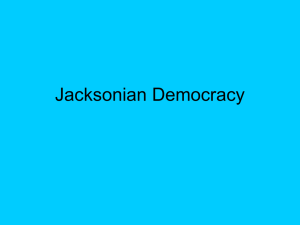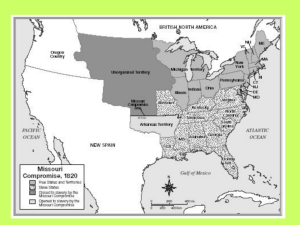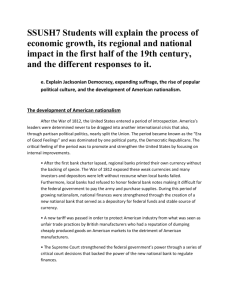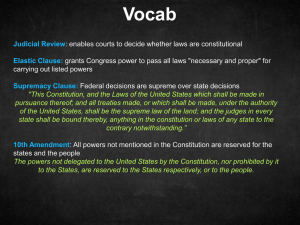File - The United States with Neil Saunders Part 1.
advertisement
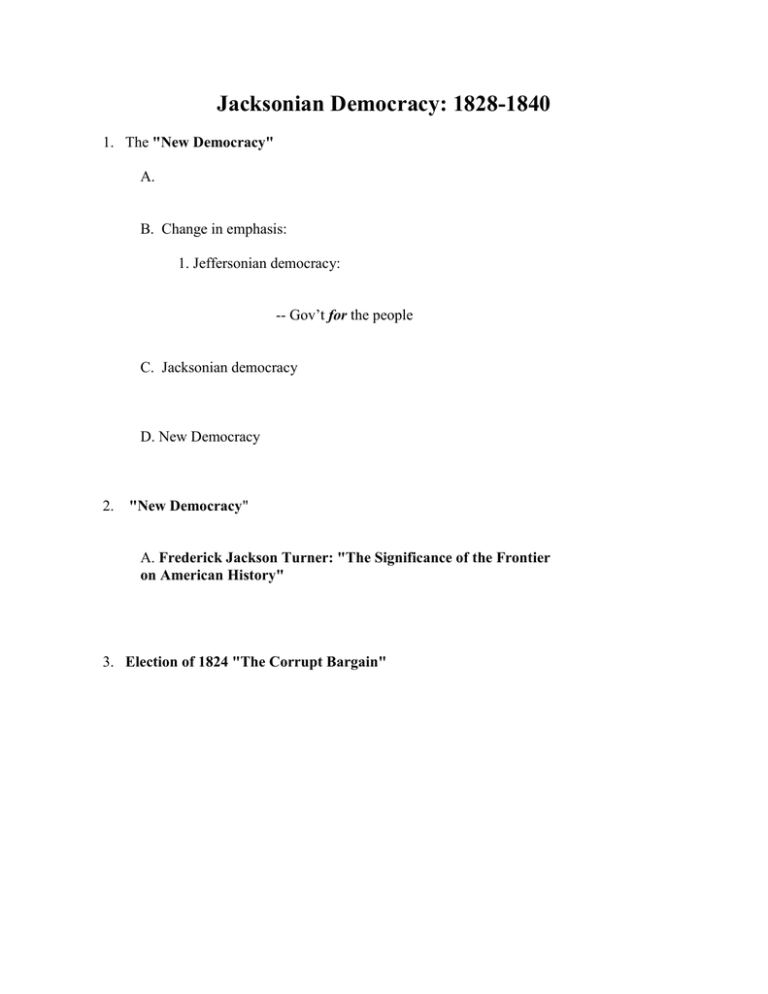
Jacksonian Democracy: 1828-1840 1. The "New Democracy" A. B. Change in emphasis: 1. Jeffersonian democracy: -- Gov’t for the people C. Jacksonian democracy D. New Democracy 2. "New Democracy" A. Frederick Jackson Turner: "The Significance of the Frontier on American History" 3. Election of 1824 "The Corrupt Bargain" 4. The "Tariff of Abominations" (1828) – biggest issue of Adams’ presidency 5. Election of 1828 A. Intense feuding between the two factions of the Republican party 1. National Republicans 2. Democratic Republicans B. 6. Andrew Jackson ("Old Hickory") 7. Jacksonian Democracy -- politics A. Increase of manhood suffrage (see above) B. End of the caucus (see above) C. Spoils System 1. Spoils system brought to the federal government on a large scale a. Spoils system: b. Martin Van Buren 8. "Kitchen Cabinet" 9. Symbolic split: Jefferson Day Toast (1830) 10. Peggy Eaton Affair 11. Nullification controversy of 1832 A. South Carolina still fuming over "Tariff of Abominations" -- 1828 B. Tariff of 1832 1. Jackson 2. South Carolina 3. Jackson's reaction 4. Henry Clay 5. Force Bill C. Aftermath 12. The Election 1928 13. End of the Bank of the United States (BUS) 1. Jackson 2. Henry Clay 3. 4. 5. "Pet bank” 14. Removal of Native Americans A. B. 15. Indian Removal Act (1830) 16. Bureau of Indian Affairs est. in 1836 17. Cherokee A. Cherokee Nation v. Georgia, 1831 B. Trail of Tears 18. Black Hawk War (1832) 19. Seminoles in Florida 20. Election of 1836 A. Birth of the Whigs Many Whig principles were foundation for modern-day Republican party. B. William Henry Harrison, C. Martin Van Buren D. Winner… Whigs Supported by northern industrialists and merchants (wealthiest Americans) Supported Clay’s "American System" Sought to reduce the spoils system Southern states’ rights advocates angry at Jackson’s stand on nullification Evangelicals from AntiMasonic party joined Later supported moral reforms: prohibition of alcohol and abolition of slavery Sought to use national gov’t to solve societies problems (over states’ rights issues) XIV. Jackson's Legacy A. Positive Contributions B. Liabilities XV. Van Buren's presidency Democrats Supported by the common people and machine politicians in the East States’ Rights – opposed to "American System" Favored spoils system Anti-monopoly—favored increased competition Believed federal gov’t should not be involved in people’s personal lives XVI. Panic of 1837 A. Causes 1. Most important cause: over speculation a. Land speculators in the West borrowed heavily from "wildcat banks." b. Speculation spread to canals, roads, and slaves. c. Unable to pay back loans causing bank failures 2. Jacksonian finance, incl. Bank War & Specie Circular, further hurt the economy. 3. Flour Riot: crop failures forced grain prices so high that NY mobs stormed warehouses and broke open flour barrels. (During Jackson's last days) 4. Failure of 2 major British banks caused English investors to call in foreign loans. -- Hurt U.S. banks and helped trigger the beginning of the panic. B. Results 1. American banks collapsed by the hundreds including "pet banks" which lost several million dollars in gov't funds. 2. Commodity prices and sale of public land fell; customs revenues dried up. 3. Factories closed; unemployment soared. C. Whig proposals blocked by Van Buren (Jacksonian ideal of limited gov't) --Sought expansion of bank credit, higher tariffs, & internal improvement funds XVII. Election of 1840 A. Van Buren renominated by Democrats B. Whigs again chose William H. Harrison over both Clay and Webster -- Slogan: Tippecanoe and Tyler Too (John Tyler was v.p. candidate) C. Voters blamed the depression on Van Buren (the party in power) D. Whigs created false myths about Harrison being a poor farmer from a log cabin: "Log Cabin and Hard Cider" E. Harrison defeats Van Buren F. Significance 1. First mass-turnout election in American history 2. Propaganda and silly slogans set unfortunate example for future campaigns. -- Solid principled party ousted for hoopla 3. Liberty Party, 1st anti-extension of slavery party, also in the race with James G. Birney as its candidate. Memory Aid for Jacksonian Democracy: “New KNICKS" New Democracy K illing of the BUS N ullification Crisis of 1832 I ndian Removal C reation of 2-party system (Democrats & Whigs) K itchen Cabinet/Cabinet Crisis (break between Jackson & Calhoun) S poils System Essay Questions for Review: 1. Identify the goals and philosophies of Jacksonian Democrats. To what extent were the Jacksonians successful in achieving these goals and implementing their philosophies on politics and economics? 2. Compare and contrast the goals and philosophies of the Democrats and Whigs (National Republicans) 3. Did federal power increase or decrease in relation to state power during the Age of Jackson? 4. To what extent did the Jacksonian era lead to more sectionalism between North and South in the years between 1828 and 1840?
